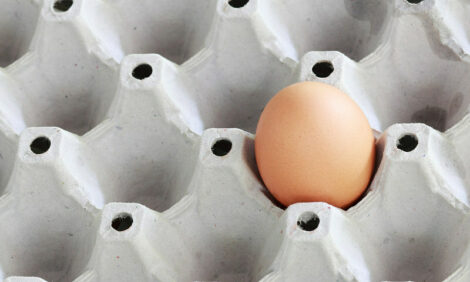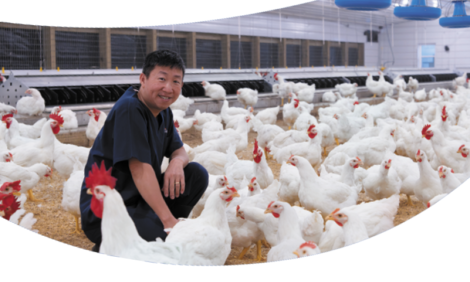



Precision livestock farming: Know today what will happen tomorrow
More animal welfare and fewer resources: Are these aspects compatible in poultry farming? This question can be answered with precision livestock farming. It is a mix of big data, networked technologies, and a holistic understanding of what keeps animals healthy.For a long time, Evonik has supplied protein building blocks as feed additives to ensure that animals utilize feed more efficiently, laying the foundation for producing meat more efficiently and sustainably. Building on this, the company is working on solutions that bring more productivity, quality, and animal welfare to the chicken house.
The digitalization of poultry fattening is paving the way for this. "Behind the concept of precision livestock farming, also called "precise production control" is a triad of animal husbandry, animal health, and animal nutrition," explains Dr. Alfred Petri, who coordinates this topic at Evonik. "It's about understanding animal protein production holistically.”
For the livestock aspect, Evonik acquired software specialist Porphyrio in 2018, then a spin-off from the University of Leuven in Belgium. Today, Porphyrio is a leader in the development of digital solutions in egg and poultry production. Data from more than 40,000 flocks are processed. Anticipating what will happen next in the flock to have optimal control of the farm is the idea, according to Porphyrio co-founder, Dr. Kristof Mertens. "Digitalization does not solve all problems, however, it is the catalyst to get them under control."
This starts with the automatic collection of key figures. An early warning system alerts breeders and farmers to changes: whether feed and water intake, weight gain, egg production - as soon as data deviates from the herd curve, something may be wrong. The system sounds the alarm. "The point is to be able to analyze what's going wrong in the short term to prevent damage," says Mertens. While it was initially pioneers who followed the idea, the group of digital farmers is now growing steadily. Poultry farmers who use digitalization are not worried about sharing their data, according to Mertens. "They know they are getting a lot of added value.”
Closely linked to the component of animal husbandry is the aspect of animal health. To monitor and ensure this, Evonik has developed the ScreenFloX® test procedure. It can be used to determine how the animals are doing – now, but also in the coming week. Genetic fingerprints are used to identify certain pathogens in chicken droppings – like the way forensic scientists detect DNA traces. The user not only learns whether pathogens are present, but also how many.
One challenge is the widespread bacterium Clostridium perfringens. As soon as it takes over a certain proportion of the intestinal flora, it can trigger subclinical necrotic enteritis. It costs chicken farmers worldwide billions of euros every year. The disease damages a chicken’s intestine, the animals suffer, and grow poorly. Once the disease has broken out clinically, only antibiotics can help.
With ScreenFloX® an outbreak can be detected several days in advance without slaughtering a single animal. Certainty of the analysis result is more than 90 per cent. The farmer can still intervene gently, for example, by administering probiotics or other substances via drinking water. Evonik has developed tests for four of the most common pathogens in the intestinal health of chickens.
Antibiotics have been used in animal nutrition as growth promoters since the 1950s. This practice has been banned in the EU since 2006 but is still common in other parts of the world. Experts fear this breeds pathogens that are resistant to more and more antibiotics and are also dangerous for humans. Therefore, the task is to protect the intestinal flora of broiler chickens and laying hens, without the use of antibiotics.
Evonik is using probiotics as a further component of precision livestock farming. In 2016, the company acquired the probiotics business from Spanish company Norel, and a year later the Essen-based company launched the first probiotic it had developed itself. It contains a Bacillus subtilis strain that has prevailed in tests against more than 500 other strains and is effective against conditions that promote necrotic enteritis.
However, precision livestock farming at Evonik also encompasses other aspects. For example, the company has invested in start-ups. InOvo from the Netherlands has developed a technology that can detect the sex of chicks in the hatching egg, making the killing of male chicks unnecessary. Optifarm, a company based in England, uses sensors and cameras to monitor chicken coops around the world; and Evonik is also involved there.
"Modern feeding concepts, the targeted administration of nutritive and functional feed additives, the strengthening of the animals' gut system, the optimization of husbandry conditions and the networking of all available data on causes and effects – all this contributes to sustainable livestock farming," says Alfred Petri. He hopes this holistic approach will make it possible to produce animal products in a more sustainable, gentle and animal-friendly way in the future. “In the end, everyone will benefit from this."









